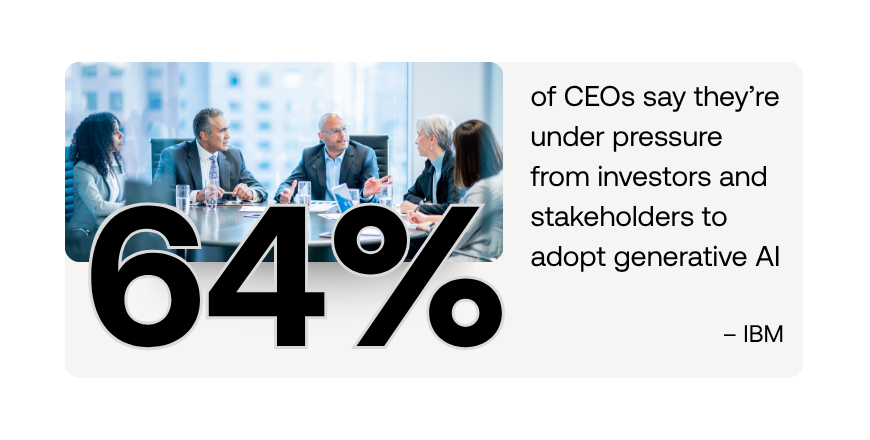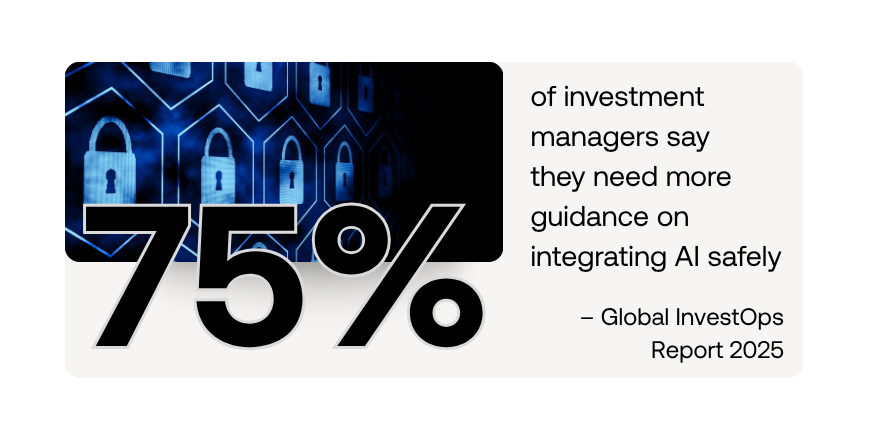
Table of Contents
- Why financial institutions must rethink their AI innovation strategy
- The AI landscape
- The need for better AI governance and strategy
Get in touch to learn how Genesis can help you modernize your workflows
Why financial institutions must rethink their AI innovation strategy
Artificial intelligence has fundamentally altered expectations in financial services. For the past few years, generative AI—especially large language models (LLMs)—has promised to optimize everything from fraud detection and customer service to software development and risk modeling. And, unsurprisingly, financial institutions have confidently invested in this technology, spending over $35 billion in AI projects in 2023 alone, with expectations for the AI-in-finance market to grow to $190.33 billion by 2030 at a CAGR of 30.6%.
But the landscape is shifting. Financial firms that once chased exponential breakthroughs are beginning to realize something critical. For some key technological needs, AI models have hit a plateau, and further gains in performance are becoming marginal.
The promise of generative AI is no longer about bigger models. It’s about better infrastructure—infrastructure that can make AI secure, scalable, and suitable for transformation in a demanding, highly regulated financial markets context. We believe, to overcome this challenge requires a thoughtful strategy: AI on guardrails.

The AI landscape
In the beginning, expectations were sky-high. According to IBM, 64% of CEOs say they’re under pressure from investors and stakeholders to adopt generative AI. But while 55% of CEOs see AI as more of an opportunity than a risk, that leaves a significant 45% viewing it as risky business (Gartner).
This is perhaps because, LLMs are stateless, probabilistic tools. They often hallucinate. In fact, a 2024 study across three universities found that LLMs hallucinated non-existent code packages in 440,000 out of 2.23 million instances, sparking concerns about what researcher Seth Larson dubbed “slopsquatting”—a vulnerability exposing businesses to fake packages and security exploits.
And an important truth is hallucination rates rise with complexity. In a legal industry study, LLMs failed on complex tasks 58% of the time, often accepting incorrect assumptions and producing flawed reasoning. This is especially concerning for the financial markets as compliance, auditability, and uptime are non-negotiable.
Even AI vendors and venture capitalists are now acknowledging that LLM advancement is slowing. More compute power no longer equates to better performance. Instead of solving problems, AI is increasingly shifting them downstream—introducing costly bugs, compliance gaps, and technical debt that show up after deployment, when fixes are most expensive.
This also comes at a time when 70% of financial institutions’ tech budgets are still allocated to maintaining legacy infrastructure. That leaves less than 10% for innovation—further constraining the ability to absorb and integrate advanced AI tools that require constant tuning and validation.

The need for better AI governance and strategy
The mainstream strategy has been to invest in ever-larger models to chase gains, but more intelligence does not necessarily equal better outcomes. Without proper structure, governance, and runtime validation, AI solutions become brittle and unpredictable. This is why 60% of firms still lack an enterprise-wide AI strategy, and why 75% of investment managers say they need more guidance on integrating AI safely. So our case here, is that AI doesn’t necessarily need to be smarter; it needs to be better supported.
At Genesis, we believe the next wave of AI innovation will come from smarter infrastructure. That’s why our approach is centered on “AI on guardrails”, an architecture-first, risk-aware strategy designed specifically for the realities of financial services.
Rather than relying on AI to write entire applications from scratch (and risk hallucinations), Genesis structures AI around controlled extension points, where its output can be validated, governed, and safely deployed.
This unique, platform-centric framework for AI makes Genesis a trusted catalyst for digital transformation throughout the financial enterprise focused in three key areas:
- Optimizing the software development lifecycle: our AI-powered IDEs and tooling (like Genesis Create) accelerate application assembly, while still enabling code to pass rigorous compliance and runtime performance standards. With AI, Genesis empowers domain experts to build 90–100% without writing code and without risking core application integrity.
- Augmenting human and AI capacity agents, our Model Context Protocol (MCP) Server and other controls delivered at runtime improve productivity by enabling dynamic workflows and advanced automation. The component-driven architecture in the platform provides a controlled environment for Gensis applications to operate in an agentic ecosystem and permits AI agents to operate autonomously within applications.
- Modernizing core infrastructure, purpose-built for financial markets, Genesis is a platform to replace outdated, underperforming technologies (vendor systems, legacy builds, EUCs, etc.) with modern, AI-capable infrastructure.
These themes are increasingly visible across financial services firms, where transformation is framed as a progression: from manual processes to BPM/RPA, then to AI assistants, agentic AI, and orchestrated AI ecosystems.
Genesis is redefining how AI works for financial services—predictable, performant, and on guardrails. Learn more about how AI on guardrails can transform your firm’s digital strategy today.










